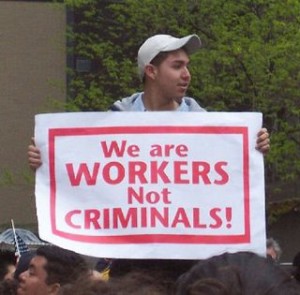
Immigration is in the news again with the influx of Central American children across U.S. borders. Some of the responses to these child immigrants have shown the ugly side of American nationalism. This skepticism toward immigration can be traced back to several of the Founding Fathers, including Benjamin Franklin, Thomas Jefferson, Alexander Hamilton, George Washington, and John Jay.[ref]Historian Thomas E. Woods, Jr. discusses their various concerns in his 33 Questions About American History You’re Not Supposed to Ask (New York: Three Rivers Press, 2007). However, some anti-immigration Americans assume immigrants are predominantly criminals, which the evidence doesn’t bear out. Furthermore, we often ignore how our own policies (such as the War on Drugs) helps create undesirable environments from which these immigrants want to escape.[/ref] However, even the skeptics among the Founders expressed the benefits of immigration. But I’m not particularly interested in cherry-picking Founders statements. What I am interested in is alleviating global poverty. Here are a few links that cover a variety of studies demonstrating increased immigration does just that:
- Economist David Henderson, writing in a 2012 issue of The Freeman, notes, “Boston University economist Patricia Cortes, in a study published in the Journal of Political Economy, found that cities with larger influxes of low-skilled immigrants had lower prices for labor-intensive services such as dry cleaning, childcare, housework, and gardening. In a later study, Cortes and coauthor Jose Tessa found that these low-price services allowed Americans, especially women, to spend more hours working in high-skilled, high-paying jobs.The gains from eliminating barriers to immigration are huge. In a recent article in the Journal of Economic Perspectives, economist Michael Clemens finds that getting rid of all immigration restrictions worldwide would approximately double world GDP.” He continues, “…Harvard University economist Lant Pritchett’s observ[es] that the average gain from a lifetime of microcredit in Bangladesh, such as that provided by Nobel Peace Prize winner Mohammed Yunus’s Grameen Bank, is about the same as the gain from eight weeks working in the United States. Asks Pritchett, “If I get 3,000 Bangladeshi workers into the US, do I get the Nobel Peace Prize?” …Pritchett found that if rich countries allowed just a 3 percent increase in their labor forces through immigration, the world’s have-nots would benefit by $300 billion a year, and the residents of the rich countries would benefit by $51 billion a year.”
- The Economist reports on a brand new study that “offer[s] ammunition for fans of more open borders. In 19 out of 20 countries, the authors calculated that shutting the doors entirely to foreign workers would make the native-born worse off. (Never mind what it would do to the immigrants themselves, who benefit far more than anyone else from being allowed to cross borders to find work.) The study also suggests that most countries could handle more immigration than they currently allow. In America, a one-percentage point increase in the proportion of immigrants in the population made the native-born 0.05% better off. The opposite was true in some countries with generous or ill-designed welfare states, however. A one-point rise in immigration made the native-born slightly worse off in Austria, Belgium, Germany, Luxembourg, the Netherlands, Sweden and Switzerland. In Belgium, immigrants who lose jobs can receive almost two-thirds of their most recent wage in state benefits, which must make the hunt for a new job less urgent. None of these effects was large, but the study undermines the claim that immigrants steal jobs from natives or drag down their wages.”[ref]This actually offers evidence for Milton Friedman’s initial point about immigration and the welfare state.[/ref]
- Lydia DePillis at The Washington Post reports on two new papers that demonstrate immigrants fill labor gaps, complement existing capital, tech, and labor, and that this complementarity increases production and consequently wages.
Be sure to read and research the actual studies.